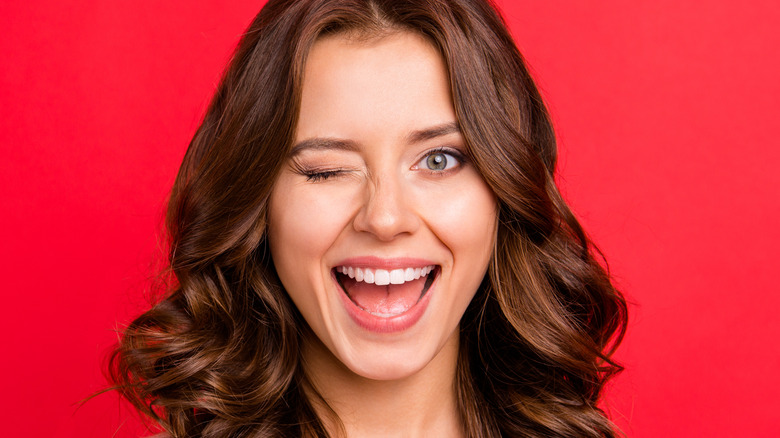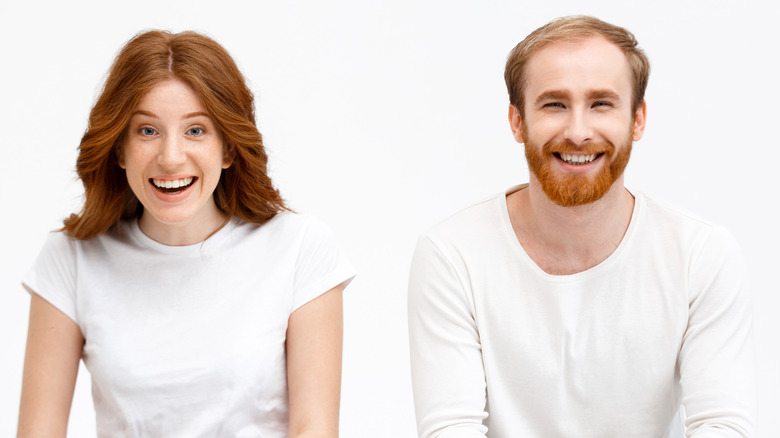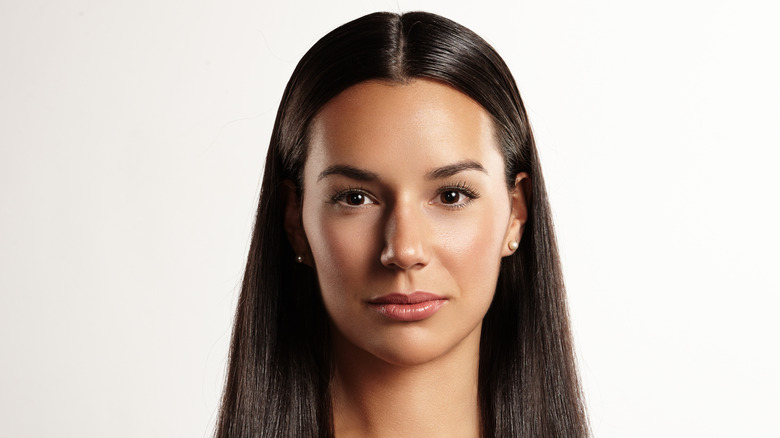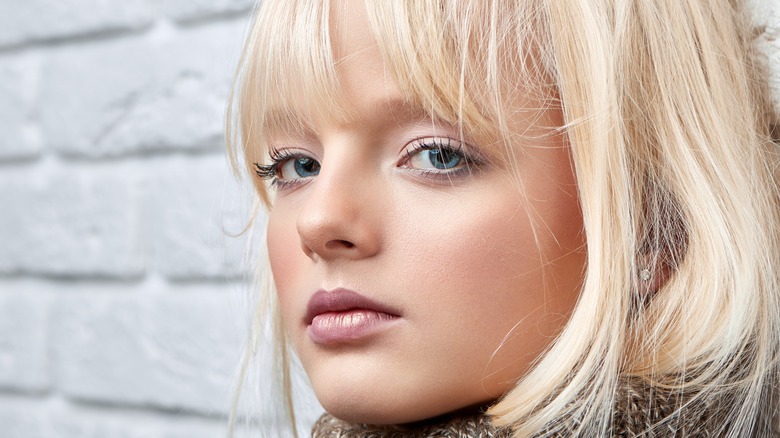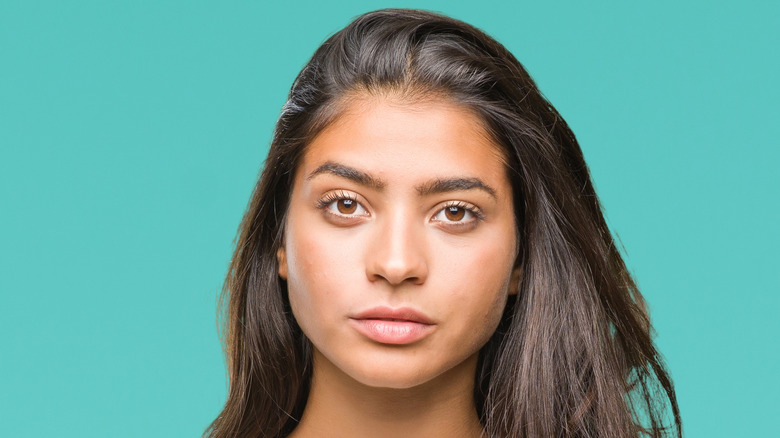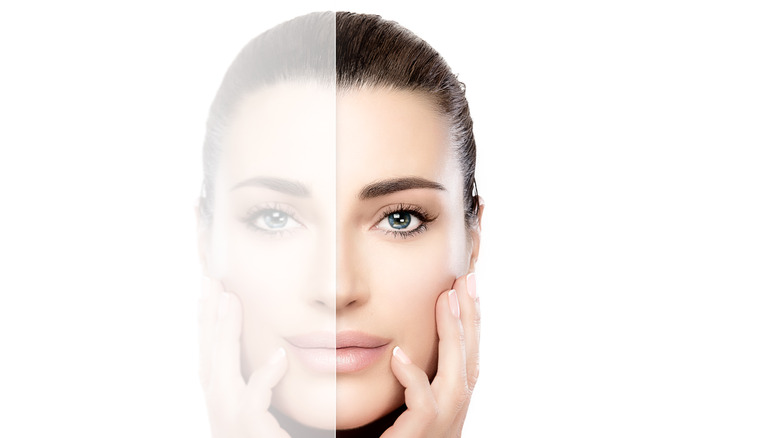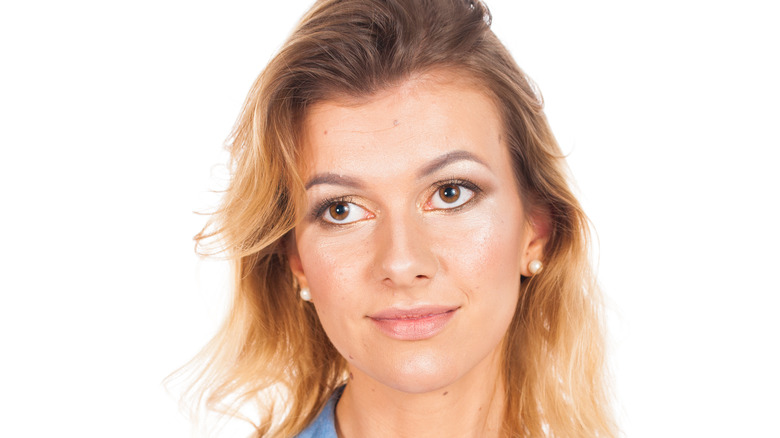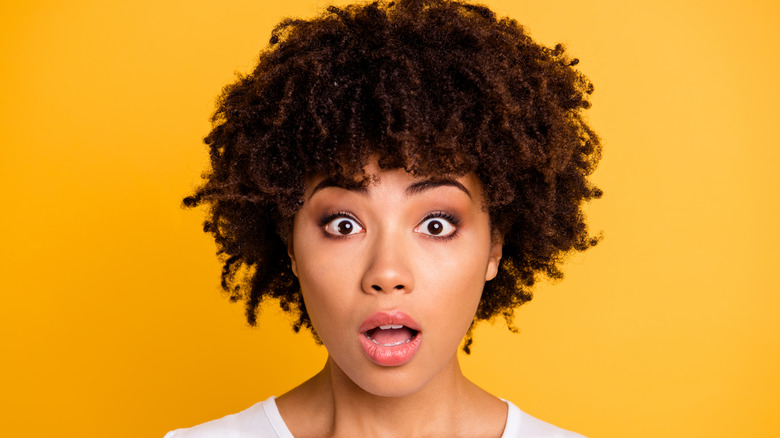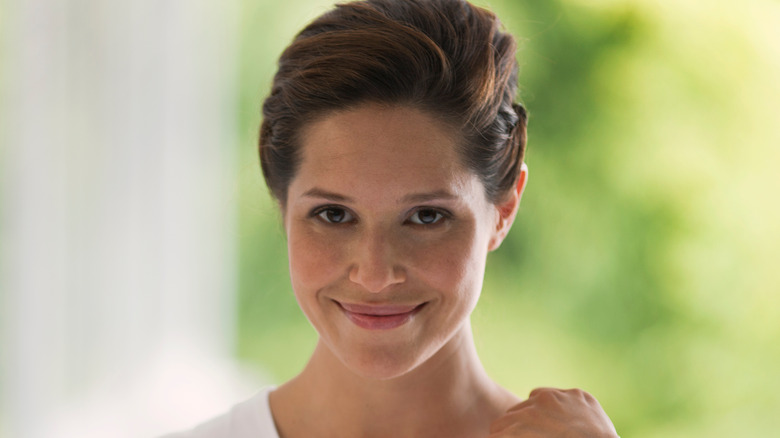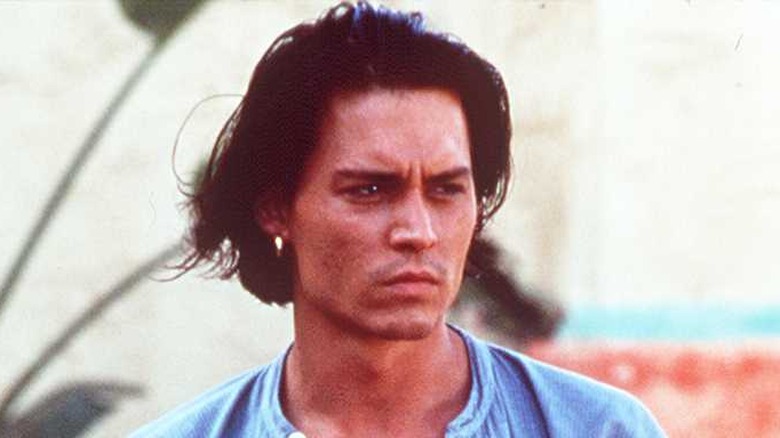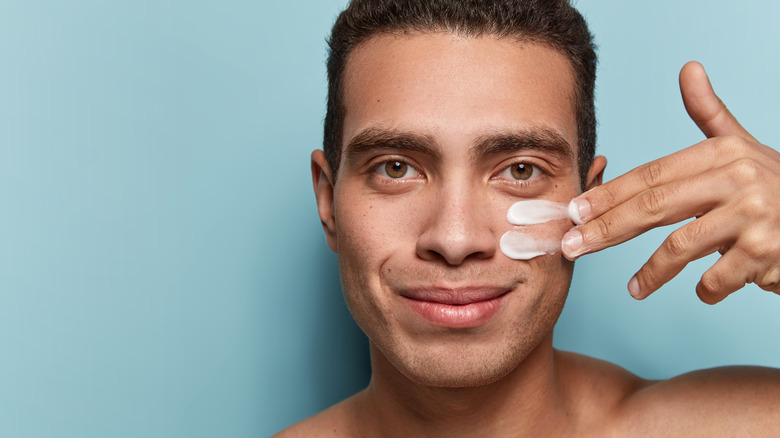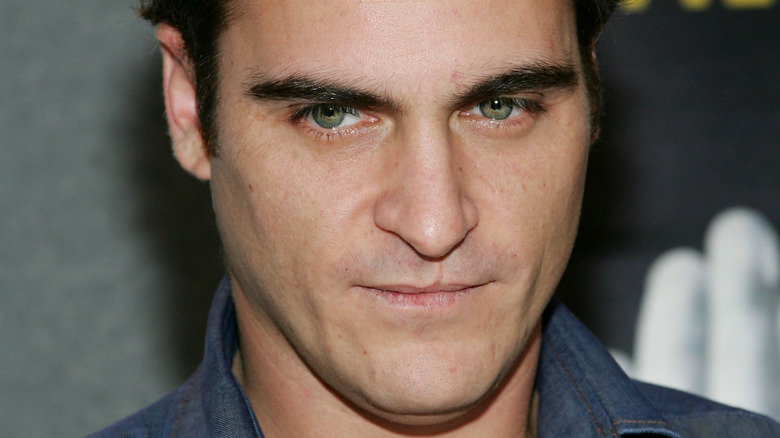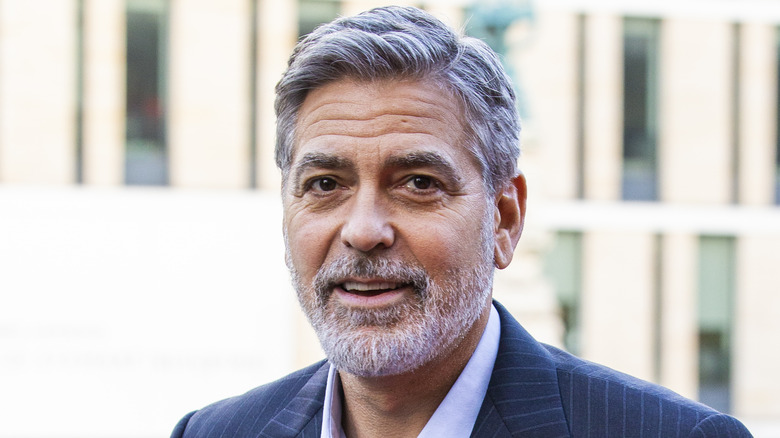The Most Attractive Facial Traits According To Science
"You have such a pretty face" might just be the most common backhanded compliment women receive. But what even is a pretty face? Aside from being a cringe-worthy snub, researchers and scientists think they've found the answer to what makes a face attractive. Yes, facial attractiveness is, apparently, quantifiable. While it's true that looking like Natalie Portman or Amber Heard is scientifically desirable — not that anyone actually needed science to confirm that, of course — you might just be surprised to learn just which particular facial traits have an influence over mass appeal. And, contrary to what you might be thinking, It's not all about having high cheekbones or pearly whites.
Actually, as it turns out, some of what convinces us that another person's face is attractive is pretty surprising and, well, kind of creepy. Without further ado, here are the most attractive facial traits a person can possess — ahem, scientifically speaking.
Familiarity
If anyone has ever come up to you and used the pickup line, "Hey, you look familiar. Do I know you from somewhere?," it is actually possible that you do look familiar. And, truth be told, that might be why the person is hitting on you. An article for the Association for Psychological Science revealed that "familiar faces are easy to process and categorize." It is thought that early in human history, people "came to link familiarity and ease-of-processing with safety and trust and good feelings." However, that's changed over time and attractiveness has become "the modern equivalent of what our ancient ancestors saw as trustworthy and safe."
This was proved to be the case through a 2012 study conducted by psychological scientist Jamin Halberstadt in which participants rated local celebrities as more attractive than morphed or averaged photos of different celebrity facial features. Familiarity may sound a bit boring on paper, but our brains have convinced us that familiar faces are actually attractive.
All about the average
If someone were to tell you that you're average-looking, you probably wouldn't be jumping up and down with joy. However, the 2012 study conducted by psychological scientist Jamin Halberstadt not only found that people prefer familiar faces, but they also prefer average faces.
In this sense, an average face is a blend of different facial features — a face that has been "averaged" together. Using pictures of national celebrities, Halberstadt digitally blended them together with faces of the same gender and nationality. By the end of the study, the participants had consistently rated the morphed images as more attractive with the exception of local celebrity faces.
"It appears that a morphed face is a good and easy-to-process example of a universal human 'face' — but it is a poor and difficult-to-process example of the original, locally known faces," the article "The Two Faces of Attractiveness" reads. "The ease of processing the prototypical faces boosts positive emotions, and these emotions generalize to make average faces generally appealing." Additional studies have also confirmed what Halberstadt found to be true: an average face is an attractive face.
And familial?
Averageness may have an edge up on familiarity when it comes to attractiveness, but you can't discount that humans like what they already know — especially when it comes to faces. And whose faces do you know better than your own family's? Yes, this is where it gets a little weird, folks.
In 2010, a study consisting of three separate experiments confirmed that people are attracted to others who either resemble themselves or their parents, or, as the study put it, "people find individuals who resemble their kin more sexually appealing." Jaime and Cersei Lannister apparently got this memo. However, it's important to note that this is on a subconscious, subliminal level.
The participants were very much not attracted to their family members' faces once they became aware of their genetic connection. So, maybe more like Jon Snow and Daenrys Targaryen? Game of Thrones characters aside, an earlier study also found that people are attracted to others who resemble their opposite-sex parent. "It is an incredibly complex phenomenon, as everybody knows," Professor Tamas Bereczkei of Hungary's Institute of Psychology at the University of Pécs told The Telegraph. Complex and cringey.
Babyface
Having a youthful-looking face — a babyface, as it were — is desirable. One study found that men rated baby-like features including "large eyes, small nose, and small chin" as most attractive. Caroline Keating, an expert in non-verbal communication at Colgate University in New York, told BBC Future, "The big eyes, the long lashes, the arched brows, the plump lips, the small chins, the round face, the cute little nose — if I wasn't describing a baby, I'd be describing a supermodel."
Although how a person acts and how a person looks are two very different things, people tend to consider those with babyfaces to have childlike characteristics, including innocence, according to Keating. "Forget expression — it's the structure of the face itself that conveys these signals," she explained. "We get our first impressions from the face and it sticks." A 2009 study further confirmed that "baby-faced individuals evoke feelings of warmth, trust and cooperation." Basically, it's babyface for the win.
Keep it simple, stupid
Simple faces are not only easier for our brains to compute, but they are also what men find most attractive, according to one 2016 study. "Think about an emoticon," Bill von Hippel, a University of Queensland psychology professor, explained to News.com.au. "You have two dots and a curved line that immediately everyone processes as a smile. It's sparse, it's plain. It's familiar, and it's easy to understand." That's not to say we literally prefer faces that look like emojis, of course, but our brains like faces that are relatively simple.
The professor went on to explain, saying, "The part of the brain processing these things means it is very much an involuntary, automatic, probably largely unconscious reaction." First impressions, he surmised, are thus very important. As the article noted, this could be part of why simple online dating apps like Tinder with swipe left/right technology have taken off.
Symmetry
Scientists have long known that symmetry plays an important role in facial attractiveness, but researchers weren't sure why. In the past, it was thought that symmetry served as an indication of health whereas asymmetry was thought to be indicative of numerous health problems, such as tonsillitis, mumps, and chicken pox. However, a study led by researcher Nicholas Pound proved that asymmetry — at least in adolescents — is not at all related to health. So, if it has nothing to do with health, why do we dig symmetrical faces?
Another theory, the "perceptual bias," suggests that symmetrical faces are easier to process. Yes, symmetrical faces are simple and easy on our brains. However, researchers have called this theory into question. According to a 2003 study, "symmetry is preferred even in familiar faces." If it was all about ease of processing, this likely wouldn't be the case. The science isn't crystal clear on why humans like symmetry, but researchers do agree that symmetry is attractive.
Asymmetry
Though a face cannot be both symmetrical and asymmetrical, it's entirely possible for people to find both sorts of faces attractive. It's also possible to prefer an asymmetrical face over one that is perfectly proportionate. "If you have a very symmetric, very easy to process face, then you have one problem: You won't be remembered so well," Claus-Christian Carbon, a professor of psychology at the University of Bamberg in Germany, told Nautilus. The expert pointed to Meryl Streep's slight asymmetries to explain this theory. "The little imperfections of her face can be [read] as a sign of authenticity," he added. Her features also make her more distinct, more recallable.
Margaret Livingstone, a neurobiology professor at Harvard Medical School, also explained to the publication that the human brain processes faces holistically, or as a grouping, not necessarily per trait. Additionally, our brains go about this work starting from the left and ending at the right. This means people don't always spot asymmetries. David Perrett, professor at St. Andrews University's School of Psychology and Neuroscience, explained, "I think because we are busy processing one side at one time, we don't notice the left-right differences."
Facial weight
One study demonstrated that "facial adiposity, or the perception of weight in the face, significantly predicts perceived health and attractiveness." From the research obtained, it was revealed that "participants could reliably estimate BMI from facial clues alone." Cue eye roll. Researchers have also found that adiposity also influences the perception of attractiveness — go figure. However, it seems whether people prefer thin or full faces is decided by who has the internet and who doesn't. For real. "We found that people without internet access preferred ... women with higher adiposity than people with internet access," the study, which was conducted in El Salvador, found.
In an additional study conducted in the UK, women were found to prefer "a lower level of facial adiposity for attractiveness than for health" whereas men did not differentiate "between the 'most attractive' and 'most healthy' looking level of facial adiposity." It may not exactly be a surprise that thin is the more the accepted ideal — even when it comes to faces.
A smiling face
Smiling is a great hack one can use to appear more attractive, it's true, but that's not to say people — especially women — should be forced to smile. "Men tell women to smile because society conditions men to think we exist for the male gaze and for their pleasure," activist Bené Viera explained to HuffPost. "Essentially what a man is saying when he tells a woman — one he doesn't even know — to smile, is that his wants outweigh her own autonomy over how she exists in the world." When you smile is up to you and we'd venture to guess that it's never going to be while walking down the street and at some rando's request.
That said, if you want to smile, science has backed up the notion that flashing a grin does indeed have a positive influence on one's attractiveness. In one study, it was discovered that photos of smilers were not only rated as more attractive than those with a neutral expression, but they were also perceived to be kinder.
The Johnny Depp effect
From a biological standpoint, male and female faces differ slightly. According to a report by the School of Psychology at the University of Aberdeen and the Department of Psychology at the University of Stirling in Scotland, hormones dictate many of these differences, like "more prominent cheekbones" and "larger jawbones" in men. It's been found that these "sexual characteristics" — that is, predominantly masculine features and feminine features — are attractive. Though, why this is the case is not fully known. The researchers said these traits may be considered attractive because they could signify "good genes" or perhaps health.
In 2016, researchers also discovered what they called the "Johnny Depp effect" — which is when male faces with feminine features are thought of as more attractive. As explained by Jamin Halberstadt, a professor at Otago's Department of Psychology, people actually generally prefer more feminine faces — "unless the context forces the viewer to put the face into rigid gender boxes."
Ambiguous faces aren't just a preference in the West. As part of the study on facial adiposity conducted in El Salvador, people without internet access were also found to prefer men with more feminine facial characteristics and women with more masculine traits.
Healthy-looking skin
Scientists have performed countless studies using blended images. However, researchers from the School of Psychology at the University of Aberdeen and the Department of Psychology at the University of Stirling in Scotland pointed out the problem with this technology. "The more images that are blended together the smoother the skin texture becomes, as imperfections such as lines or blemishes are averaged," they explained in their report.
Still, one study did take on the challenge. The results indicated that the "apparent health of facial skin is correlated both with ratings of male facial attractiveness ... and with being a visual cue for judgments of the attractiveness of male faces." Another study that evaluated Caucasian men with digitally altered skin tones also found that women highly favored faces with a so-called healthy glow, that is skin with more yellow and red tones.
The reason for this may be rooted in health, the study's co-author Ian Penton-Voak explained to National Geographic. Yellowish hues can indicate healthy eating habits whereas a more reddish color can indicate fitness. Healthy skin was also found to be much more important to women than masculine features, which actually didn't seem to play any significant role.
Scars
Facial scars as so hot right now. Scientists at the University of Liverpool revealed that men with facial scars are considered to be more attractive to women who are looking for a fling. It's true. This is interesting because facial scarring doesn't exactly fit the bill for what is generally considered attractive, like symmetry, skin health, or simplicity.
As part of the study, men and women were asked to view images of faces that were scarred from either injury or illness and then asked to the rate the person's attractiveness for both short-term and long-term relationships. Rob Burriss of University of Liverpool's School of Biological Sciences explained the study in a public release (via EurekAlert!): "Women may have rated scarring as an attractive quality for short-term relationships because they found it to be a symbol of masculinity, a feature that is linked to high testosterone levels and an indicator of good genetic qualities that can be passed on to offspring." Men without any facial scarring, on the other hand, were rated as "more caring" and thought to be better suited for long-term relationships. It might just be, Burriss speculated, that women find facial scarring attractive because it historically signifies bravery.
Facial hair
Just as women rated men with facial scars to be variably attractive depending on potential relationship status, men and women in another study found beards more attractive than shaved faces when looking for a long-term relationship. Why? Researchers can only speculate. It could be that, as the study's authors explained, "beards consistently render men with an older, more masculine, socially dominant and aggressive appearance." Or beards could just be considered more attractive to women when looking for something long-term because "they indicate a male's ability to successfully compete socially with other males for resources."
As great as beards were found to be for long-term relationships, the female participants found "heavy stubble," or "10 days of beard growth," to be the most attractive form of facial hair overall. It may surprise you that clean-shaven faces came in last place across the board. Irrespective of potential relationship status, an overwhelming portion of the over 9,000 participants (more than 8,000 female and 1,000 male) did not prefer shaved faces.
Facial maturity
The "George Clooney effect" — not to be confused with the "Johnny Depp effect" — is what psychologists have dubbed the relationship between older men and younger women. According to Business Insider, a study in Scotland found the more financially independent a woman is, the more likely she is to date a handsome, older man. This isn't what researchers thought would happen. "We'd assumed that as women earn more, their partner preferences would actually become more like those of men, with a tendency towards preferring younger, more attractive partners rather than those who can provide and care for children," the study's lead researcher, Fhionna Moore, revealed in a statement. She continued, adding, "We think this suggests greater financial independence gives women more confidence in partner choices, and attracts them to powerful, attractive older men."
Whatever the reason, many find agedness — including aged faces — attractive. As it happens, the authors of a study on facial hair confirmed that the maturity factor is part of what makes stubble so alluring.
